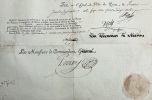12 books for « la fayette gilbert du... »Edit
-
Century
18th (1)
19th (3)
20th (2)
-
Countries
Belgium (1)
France (10)
Switzerland (1)
-
Syndicate
CLAM (1)
ILAB (8)
SLAM (7)
SNCAO (1)
LA FAYETTE (Gilbert du Motier de), POIREY (Joseph-Léonard), BAILLY (Jean Sylvain), BOULA (Guillaume-Sylvain).
Reference : 4503
(1791)
Brevet de lieutenant de chasseurs volontaires de la Garde Nationale Parisienne.
Hotel de ville de Paris, 1er et 6 septembre 1791. 1791 1 feuille in-folio manuscrite à l'encre brune recto-verso (382 X 246 mm.) signée Henry, La Fayette, Bailly, Poirey et Dejoly, cachet en bas à droite (traces de plis avec cassures ancienement restaurées, taches ou traces d'adésif ). Chemise de papier ancien.
Brevet de lieutenant de la Garde Nationale Parisienne portant les signatures de Bailly, premier maire de Paris, de La Fayette, commandent fondateur de la garde et de Joseph-Léonard POIREY, son ancien compagnon darmes de la Guerre dAmérique, alors secrétaire général des Gardes nationales, document raturé postérieurement. Marie Joseph Paul Yves Roch Gilbert Motier, marquis de La Fayette (1757-1834), auréolé par son héroïsme à défendre les libertés pendant la guerre dindépendance américaine, est en 1789 le fondateur de la Garde nationale à Paris le 15 juillet 1789. Il en demeure le général jusquà sa démission le 8 octobre 1791 suite aux troubles révolutionnaires survenus les mois précédents. Joseph-Léonard Poirey (1748- , qui fut son secrétaire militaire pendant la Révolution américaine, participe à aux batailles à Petersburg, Jamestown et Yorktown. Rentré en France avec Lafayette, il sert comme capitaine secrétaire général de la Garde nationale française fin 1789 et ensuite secrétaire général des troupes parisiennes. En 1790, le Sénat des États-Unis confirme la nomination de Poirey par le président George Washington au grade de brevet de capitaine et, l'année suivante, il est admis dans la Society of the Cincinnati. George Washington écrit au sénat le 30 mai 1790 : « M. de Poirey served in the American Army for several of the last years of the late war, as Secretary to Major General the Marquis de la Fayette, and might probably at that time have obtained the Commission of Captain from Congress upon application to that Body. At present he is an officer in the French National Guards, and solicits a Brevet Commission from the United States of America. I am authorised to add, that, while the compliance will involve no expense on our part, it will be particularly grateful to that friend of America, the Marquis de la Fayette. Et La Fayette écrira le 20 avril 1801. « I do but justice to Captain [Joseph-Léonard] Poirey when being called upon as a witness of his services in the American Revolution... » Jean Sylvain Bailly (1736-1793), mathématicien, astronome, académicien, écrivain est désigné maire de Paris le 15 juillet 1789 par acclamation. C'est à ce titre qu'il remet la cocarde tricolore au roi, lors de la visite que celui-ci rend à l'hôtel de ville, le 17 juillet. Le 17 juillet 1791, la Garde nationale, sous ses ordres, tire sur les pétitionnaires qui se tiennent sur le Champ-de-Mars. Sa popularité tombe au plus bas et le 12 novembre, il démissionne. Le présent brevet établis au nom du lieutenant Guillaume-Sylvain Boula étant rédigé au début du mois de septembre 1791, il porte les signatures de Bailly et de La Fayette alors en fonction. Sy ajoute celle du greffier (Dejoly). Cependant, celle du général a été postérieurement barrée ainsi que les mots imprimés « Par Monsieur le Maire » et « Général ». Rare et beau document. 1 sheet in-folio handwritten in brown ink on both sides (382 X 246 mm.) signed Henry, La Fayette, Bailly, Poirey and Dejoly, stamped at the bottom right corner (traces of folds with old restored breaks, stains or traces of adesif ). Old paper folder. Patent of lieutenant of the Parisian National Guard bearing the signatures of Bailly, first mayor of Paris, of La Fayette, founding commander of the guard and of Joseph-Léonard POIREY, his former comrade-in-arms of the American War, then secretary general of the National Guard, document erased later. Marie Joseph Paul Yves Roch Gilbert Motier, marquis de La Fayette (1757-1834), honored by his heroism in defending liberties during the American war of independence, was the founder of the National Guard in Paris on July 15, 1789. He remained its general until his resignation on October 8, 1791, following the revolutionary unrest of the previous months. Joseph-Léonard Poirey (1748- , who was his military secretary during the American Revolution, participated in the battles at Petersburg, Jamestown and Yorktown. Returning to France with Lafayette, he served as captain general secretary of the French National Guard at the end of 1789 and then general secretary of the Parisian troops. In 1790, the U.S. Senate confirmed President George Washington's appointment of Poirey to the rank of captain and the following year he was admitted to the Society of the Cincinnati. George Washington wrote to the Senate on May 30, 1790: "M. de Poirey served in the American Army for several of the last years of the late war, as Secretary to Major General the Marquis de la Fayette, and might probably at that time have obtained the Commission of Captain from Congress upon application to that Body. At present he is an officer in the French National Guards, and solicits a Brevet Commission from the United States of America. I am authorized to add, that, while the compliance will involve no expense on our part, it will be particularly grateful to that friend of America, the Marquis de la Fayette. And La Fayette will write on April 20, 1801. "I do but justice to Captain [Joseph-Léonard] Poirey when being called upon as a witness of his services in the American Revolution..." Jean Sylvain Bailly (1736-1793), mathematician, astronomer, academician, writer was appointed mayor of Paris on July 15, 1789 by acclamation. It was in this capacity that he gave the tricolor cockade to the king during the latter's visit to the town hall on July 17. On July 17, 1791, the National Guard, under his orders, shot at the petitioners who were standing on the Champ-de-Mars. His popularity fell to a low point and on November 12, he resigned. The present patent established in the name of lieutenant Guillaume-Sylvain Boula being written at the beginning of September 1791, it bears the signatures of Bailly and La Fayette then in office. The clerk's signature (Dejoly) is added to it. However, that of the general was later crossed out as well as the printed words "Par Monsieur le Maire" and "Général". Rare and beautiful document.


Phone number : 06 81 35 73 35
Mémoires, correspondance et manuscrits du général La Fayette publiés par sa famille.
Paris, H. Fournier aîné, Leipzig, Brockhaus & Avenarius, 1837-1838. 6 vols. in-8 de (4)-VIII- 495 pp. ; (4)-504 pp. ; (4)-520 pp. ; (4)-II-448-(2) pp. ; (4)-544-(2) pp. ; (4)-814 pp., la carte manque, demi-veau taupe, dos lisse orné, pièces de titre et de tomaison en maroquin noir (reliure de l'époque).
Édition originale précédée d'une introduction par Georges Washington La Fayette, le fils du général qu'il accompagna pendant son périple américain de 1824-1825. Les six volumes renferment la correspondance, les proclamations, discours et actes divers de La Fayette, ainsi que des fragments de mémoires. On trouve ainsi, au tome 4, Mes rapports avec le Premier Consul, écrits entre 1804 et 1807. L'éditeur François de Corcelle annonce en tête avoir publié « ces manuscrits sans aucun commentaire et les remettre intacts entre les mains des amis de la liberté ». Provenance : bibliothèque du Maréchal Harispe au Château Lacarre (ex-libris).Quelques rousseurs, dos passés, (tome 2:) déchirure en coin pages 177-178 avec perte de quelques lettres.Fierro, 792 ; Tulard, 805 ; Bertier, 576 ; Sabin, 38575.
Mémoires, correspondance et manuscrits du général Lafayette publiés par sa famille. [Les 5 premiers volumes sur 6].
Paris, Fournier aîné, Londres, Saunders & Otley, puis Leipzig, Brockhaus & Avenarius, 1837-1838. Cinq volumes in-8 (13 x 21,5 cm) de (2) ff., VIII pp., 495 pp. ; (2) ff., 504 pp. ; (2) ff., 520 pp. ; (3) ff., II pp., 449 pp. ; (2) ff., 544 pp., (1) f. d'errata. Reliures demi-veau violine, dos lisses ornés de filets, titres dorés. Reliures légèrement usées, coins émoussés, sinon bons exemplaires. Les cinq premiers tomes de cette édition originale, publiée par F. de Corcelles, manque le tome 6. Ces cinq volumes contiennent surtout de la correspondance, les proclamations, discours et actes divers de La Fayette. Les deux premiers volumes vont de 1777 à 1790, les troisième et quatrième volumes, vont de la fête de la Fédération, le 14 juillet 1790, à 1797, les volumes suivants comprennent : " Mes rapports avec le Premier Consul (fragment de mémoires écrits entre 1804 et 1807), la correspondance de La Fayette entre novembre 1799 et novembre 1813, des souvenirs sur les années 1814-1815, écrits entre 1817 et 1818 (ces textes permettent d'éclairer l'attitude de La Fayette pendant cette période). Notre exemplaire est incomplet de la carte gravée des Opérations de la Virginie en 1781 qui manque souvent.
Correspondance inédite de La Fayette, 1793-1801. Lettres de prison - Lettres d'exil. Précédées d'une étude psychologique par Jules Thomas.
Librairie Ch. Delagrave, s.d. (1903), in-8°, 389 pp, un portrait en frontispice, reliure demi-percaline vermillon, pièce de titre bleue, qqs rousseurs sur les tous premiers et derniers feuillets, bon état
Edition originale de 56 lettres écrites par La Fayette pendant sa captivité par les Autrichiens (de 1792 à 1797), puis dans sa période d'exil.
Lettre des commissaires de l'armée du centre à l'assemblée nationale. suivie de Lettres du Conseil-général de la Commune de Sedan & de M. La Fayette
Paris, Imprimerie Nationale, s.d. in-8, 7 pp. Petit manque au dernier feuillet sans atteinte de texte.
- - VENTE PAR CORRESPONDANCE UNIQUEMENT - LIEN DE PAIEMENT, NOUS CONSULTER.
[Baudouin Frères] - LAFAYETTE, M. de ; [ LA FAYETTE, Gilbert DU MOTIER DE ]
Reference : 59842
(1820)
Opinion de M. de Lafayette, Député de la Sarthe, sur le Projet de Loi relatif aux Elections. Séance du 27 mai 1820 [ Edition originale ]
1 brochure in-8, Baudouin Frères, Paris, 1820, 20 pp.
Trois mois après, La Fayette sera mêlé au complot du Bazar français. Dès l'année suivante, il entrera dans la Charbonnerie. Bon état
Discours.. Prononcé dans la séance du 23 juillet 1822
Paris, Baudouin, 1822 in-8, 8 pp.
Sur le budget de la justice criminelle. - - VENTE PAR CORRESPONDANCE UNIQUEMENT - LIEN DE PAIEMENT, NOUS CONSULTER.
Letters.. Edited by Edward Everett Dale, professor of history in the University of Oklahoma
Oklahoma City, Harlow Publishing Co, 1925 in-8, 61-[3] pp., portrait frontispice, 4 planches, fac-similés de lettres, bradel percaline bleu nuit (reliure de l'éditeur). Manque de papier à la page de titre, dos passé.
- - VENTE PAR CORRESPONDANCE UNIQUEMENT - LIEN DE PAIEMENT, NOUS CONSULTER.
Mémoires, correspondance et manuscrits.
Bruxelles, Soc. Belge de Librairie, 1837-1839 12 vol. in-16, cartonnage papier fantaisie à la Bradel, couv. cons. (reliure postérieure). Mouillure aux tomes VII, VIII et IX. Ex-libris Bibliothèque du Comte Chevreau d'Antraigues.
Contrefaçon belge de l'édition originale. - - VENTE PAR CORRESPONDANCE UNIQUEMENT - LIEN DE PAIEMENT, NOUS CONSULTER.
LA FAYETTE (MARIE-JOSEPH GILBERT DU MOTIER, MARQUIS DE. 1757-1834).
Reference : 3808
(1837)
MEMOIRES, CORRESPONDANCE ET MANUSCRITS DU GENERAL LA FAYETTE, PUBLIES PAR SA FAMILLE.
PARIS. H. FOURNIER AINE, EDITEUR. LONDRES. SAUNDERS & OTLEY. 1837-1838. 6 TOMES EN 3 VOLUMES IN-8 (13,5 X 21,5 X 16 CENTIMETRES ENVIRON) DE (4) + VIII + 495, (4) + 504, (4) + 520, (4) + II + 448 + (1), (4) + 544 + (1) ET (4) + 814 PAGES, RELIURE D'EPOQUE 1/2 VEAU FAUVE, DOS A QUATRE NERS ORNE D'UN JOLI DECOR DE FLEURONS DORES, TITRE DORE SUR ETIQUETTE MAROQUIN NOIR, TRANCHES MARBREES. SANS LA CARTE DES OPERATIONS EN VIRGINIE EN 1781, QUI MANQUE SOUVENT ET NE SEMBLE PAS AVOIR ETE RELIEE D’ORIGINE DANS CET EXEMPLAIRE. EDITION ORIGINALE TRES RARE. BON EXEMPLAIRE, DANS UNE RELIURE STRICTEMENT CONTEMPORAINE. .
[Gilbert du Motier de La Fayette] ADAM Paul - (Paris 1862 - Paris 1920) - écrivain français
Reference : GF19471
Manuscrit Autographe Signé intitulé: "Une Epopée Française" - "Vie de Lafayette" -
11 pages autographes in4 en feuilles sous couverture cartonnée - ratures et corrections -
Texte biographique - Il est surpris que l'épopée du marquis n'ait pas "tenté quelqu'un des jeunes poètes" puisque sa vie est un étonnant roman -
JEFFERSON (Thomas) et (Marie-Joseph Paul Yves Roch Gilbert du Motier, marquis de) LA FAYETTE par Gilbert CHINARD.
Reference : AUB-3980
(1929)
The letters of Lafayette and Jefferson with an introduction and notes by Gilbert Chinard.
Paris, Les Belles Lettres et Londres, 1929. Bel exemplaire broché, couverture ornée d'éd., no 645/800, pet. in-4, XV + 443 pages avec annexes.
 Write to the booksellers
Write to the booksellers




![Mémoires, correspondance et manuscrits du général Lafayette publiés par sa famille. [Les 5 premiers volumes sur 6]. . LA FAYETTE Gilbert du Motier, ...](https://static.livre-rare-book.com/pictures/QKR/3512_1_thumb.jpg)
![Mémoires, correspondance et manuscrits du général Lafayette publiés par sa famille. [Les 5 premiers volumes sur 6]. . LA FAYETTE Gilbert du Motier, ...](https://static.livre-rare-book.com/pictures/QKR/3512_2_thumb.jpg)
![Mémoires, correspondance et manuscrits du général Lafayette publiés par sa famille. [Les 5 premiers volumes sur 6]. . LA FAYETTE Gilbert du Motier, ...](https://static.livre-rare-book.com/pictures/QKR/3512_3_thumb.jpg)
![Opinion de M. de Lafayette, Député de la Sarthe, sur le Projet de Loi relatif aux Elections. Séance du 27 mai 1820 [ Edition originale ]. LAFAYETTE, ...](https://static.livre-rare-book.com/pictures/CDL/59842_thumb.jpg)
![Opinion de M. de Lafayette, Député de la Sarthe, sur le Projet de Loi relatif aux Elections. Séance du 27 mai 1820 [ Edition originale ]. LAFAYETTE, ...](https://static.livre-rare-book.com/pictures/CDL/59842_2_thumb.jpg)
![Opinion de M. de Lafayette, Député de la Sarthe, sur le Projet de Loi relatif aux Elections. Séance du 27 mai 1820 [ Edition originale ]. LAFAYETTE, ...](https://static.livre-rare-book.com/pictures/CDL/59842_3_thumb.jpg)




